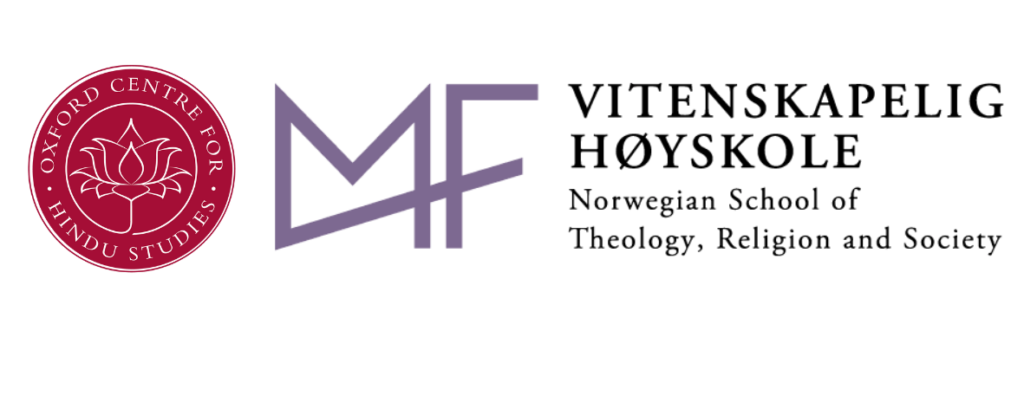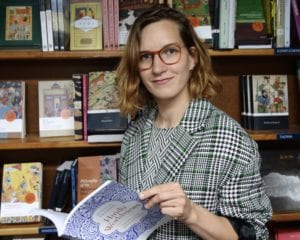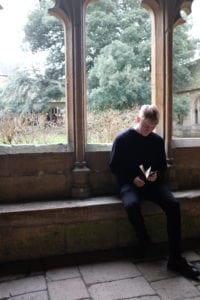Together with MF Norwegian School of Theology, Religion and Society we welcome Visiting students both at undergraduate and graduate level. As a visiting student, you can follow taught courses or undertake a period of research under a supervisor.
These courses are for you if you are enrolled at a university and have already completed an introductory course to Hinduism at your own university or if you recently completed a degree.
Courses will be taught by the OCHS and you will get ECTS accreditation from MF Norwegian School of Theology, Religion and Society. As a Visiting Student, you do not become a member of an Oxford college and you do not matriculate at the University of Oxford.

If you want to apply to our Visiting Student Programme please send an application to secretary@ochs.org.uk. In order to be considered for the Fall Term 2025 we need your application before 1 May, 2025 and to be considered for the Spring Term 2026, we need to have your application in hand before 15 November 2025.
Your application should include a motivational letter not exceeding 1 page, your CV, and a transcript of your grades from your current university programme. Your motivational letter should answer the following questions. 1) Why do you want to study at the OCHS, 2) which courses you are interested in, and 3) a short description of your previous courses within Hindu Studies. 4) If you wish to get thesis supervision you also need to include a paragraph on the topic you wish to write your thesis on.
Fees are payable to cover the cost of access to our facilities including a library card as well as lectures, tutorials, and supervision.
Fees for the Spring Terms 2026 (Hilary and Trinity): £ 2850 for 30 ECTS in Oxford.
Fees for the Fall Term 2026 (Michaelmas): £ 1950 for the 10 ECTS Vrindavan course in December 2025 and £1900 for 20 ECTS in Oxford.
You can become a member of Oxford Societies in Oxford which hosts regular social events that we would encourage you to participate in. You can read more about ScanSoc here.
The fees do not include accommodation. For accommodation, we recommend North Oxford Over Seas Centre (NOOC). You should also consider your living costs, here we refer to the Oxford University guidelines.
We offer courses in Sanskrit for beginners and continued Sanskrit, manuscript readings, Hinduism, Indian philosophy, phenomenology, and yoga and tantra (subject to availability each term). We also supervise BA and MA thesis projects. You can read more about the course structure here.
 You will have access to a wide range of facilities in Oxford, including the Bodleian Libraries, the OCHS library, and the great wealth of lectures organised by the OCHS and the University of Oxford throughout the academic year.
You will have access to a wide range of facilities in Oxford, including the Bodleian Libraries, the OCHS library, and the great wealth of lectures organised by the OCHS and the University of Oxford throughout the academic year.
Danish students can apply for Udlandsstipendie, which is a grant of 23.000 kr for 30ECTS from the Danish state they can use towards their tuition fee.
Students can also apply for OCHS bursaries and scholarships.
List of suggested funds that have previously supported visiting students at the OCHS:
– Augustinus Fonden (Denmark)
– William Demant fonden (Denmark)
– Arts rejsestipendium (Aarhus University)
– Knud Højgaards fond (Denmark)
 In October 2014, the first visiting student from Aarhus University came to the OCHS, and ever since then Danish students have been a fixture in nearly every term at the OCHS.
In October 2014, the first visiting student from Aarhus University came to the OCHS, and ever since then Danish students have been a fixture in nearly every term at the OCHS.
The exchange program was established by Dr Bjarne Wernicke-Olesen through a Memorandum of Understanding (MoU) between the Department for the Study of Religion, Aarhus University and the Oxford Centre for Hindu Studies (OCHS).
Through this collaboration, Danish students interested in further developing their study of Sanskrit, have the opportunity to visit and study the OCHS for one or several terms as a part of their studies in Denmark.
The program has so far included both undergraduate, graduate, and Ph.D. students who come to Oxford to work on their own projects and interest.
Students have taken tutorials and lectures, and been provided with guidance by the OCHS in combination with experiencing the academic life of Oxford independently. Most students were used to large lectures with 40–70 people attending, making it direct discussion and engaging with texts a difficult task. Seeing and encountering the lively discussions made possible with smaller groups, for instance during the Phenomenology readings, is a very different and unique academic experience for a Danish student.
The tutorial system compels students to develop their own thoughts and ideas – their own projects – and not just to study towards an exam. This is a proper glimpse of the Oxford experience: a university that enables and inspires students to think critically and independently rather than simply replicating a curriculum.